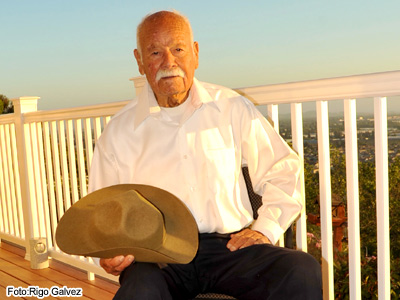
One of the sons of famed Mexican revolutionary leader Pancho Villa, is alive, well, and living in Hayward. Ernesto Nava, now 94, was a young child when his legendary father was assassinated in 1923 after having retired from his military career. Though Ernesto did not know his father, he had to carry the secret of his father’s identity for most of his long life.
“I remember when my mother told me about my father,” says Ernesto. “She told me to ‘Never,
never say to anybody who is your father’.”“I was 7 or 8 years when she told me,” he says. “I did not know who he was (Pancho villa). She told who was my father and a little bit of the story, not much. She was really afraid of telling people about it,” he adds. His mother told him that “it is very dangerous if people know” - she was afraid that Villa's enemies would kill Ernesto.
Ernesto promised his mother that I would never tell anyone. He understood that his father’s name could not be spoken here in the U.S. or Mexico. His mother also change Ernesto’s name to her name. “That is why I am Nava not Villa like my father,” he says.
Keeping his promise for nearly 70 years, Ernesto told no-one until his son, Raul, finally asked him. Raul says that his mother had told him many years ago, but hearing it from his father was the real confirmation. Raul told Ernesto that he would have to research the history and the best way to do that was to bring his father back to Mexico. “I took him back to Mexico in 1988,” says Raul. “He hadn’t been back there for 70 years.” Ernesto, who was born in Durango, Mexico, told Raul to go to Parral, Chihuahua, where Raul asked his father if he could tell somebody their story. Ernesto agreed. “And after we told the story we could not get out of the town,” says Ernesto. “A lot of people came with flags - I think all the pueblo was there. We had to stay for two more days - people did not want us to leave.”
“In Mexico he (Pancho) represented people who didn’t have hope, education, opportunity or freedom – especially education,” says Raul. When they arrived back in Hayward, Ernesto says that a lot of people were outside of his house.
One of Ernesto’s other sons, Samuel, recounts that when he was young and working with his father in construction or other work, many people would tell Ernesto that he looks like very much like Pancho Villa. Photos of Pancho and Ernesto do show a strong similarity.
“When I was about 21 or 22, my mother sat me down and told me,” says Samuel. “I use to hear back in the sixties (about Pancho), and read stories. That man is the greatest men for the Mexican people.”
For Ernesto and his family, the connection to Pancho Villa is no longer a source of fear or mystery, but pride. After holding a secret for so many years, today Ernesto says, “I feel happy to be able to say who was my father.”
